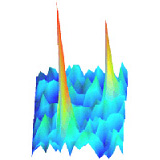Our NWO-EW Groot program grant was granted. In this program we seek for a physical understanding of the processes involved in metastases. The dream would be that such understanding might lead to novel intervention strategies.
Genetic programs driving metastasis of solid tumors vary between cancer types and even between people carrying the same cancer type. Nevertheless, the ultimate outcome is shared: cancer cells are empowered to pass a series of physical hurdles to escape the original tumor and disseminate to other organs. Accumulating evidence suggests that metastasis in most cases involves collective cell behavior whereby cell clusters pass these hurdles more successfully than individual cancer cells. This collective advantage is not understood but in recent years, “active matter” has emerged as a new paradigm to describe collective behavior across length scales: from bird flocks down to artificial self-propelled particles. This paradigm was recently found to describe cellular collectivity in biological processes like embryonic development and wound healing with surprising accuracy. In our program, we will develop and experimentally test a new theoretical framework based on concepts from active matter physics to understand how the collective behavior of cancer cells drives the early stages of metastasis. Multiscale theoretical models will be combined with in vitro and in vivo experimental biology and biophysics to unravel how motile clusters originate and dissociate from the primary tumor; how they navigate the mechanically complex environment as they invade surrounding tissues; and how they enter the blood stream to spread to distant organs. Our program identifies the key physical determinants of the early steps leading to systemic metastasis, providing new handles for rational design of future cancer therapy targeting principles shared across solid tumors.
Groups involved: Danen (LU), Friedl (RUMC), Giomi (UL), Janssen (TUe), Koenderink (TUD), de Roij (UMC), Schmidt (UL), den Toonder (TUe)

